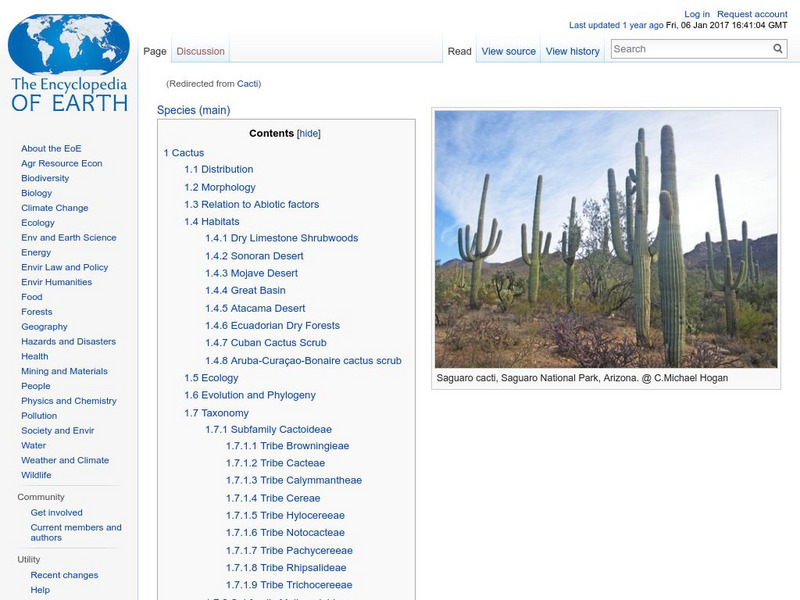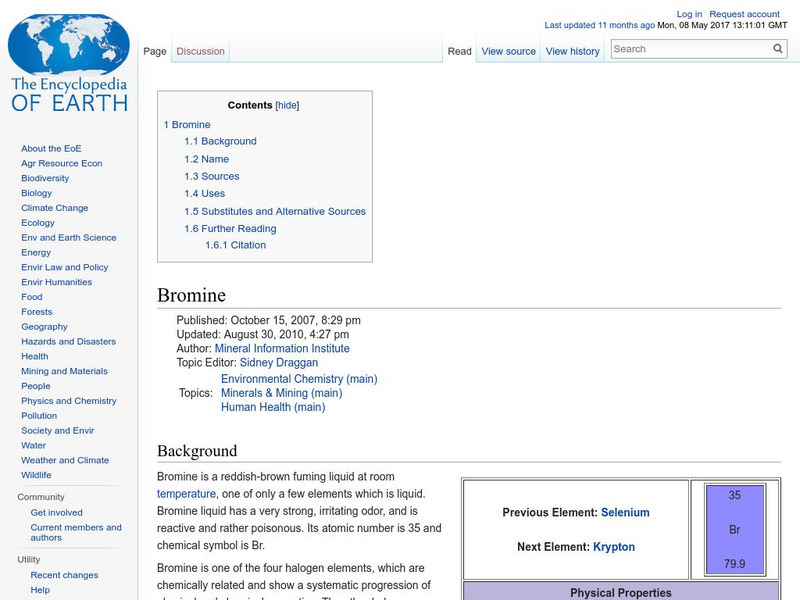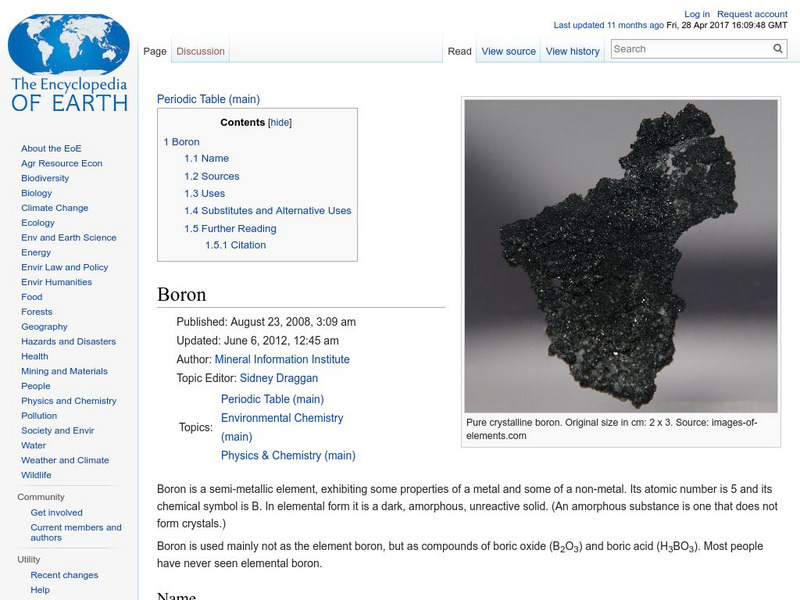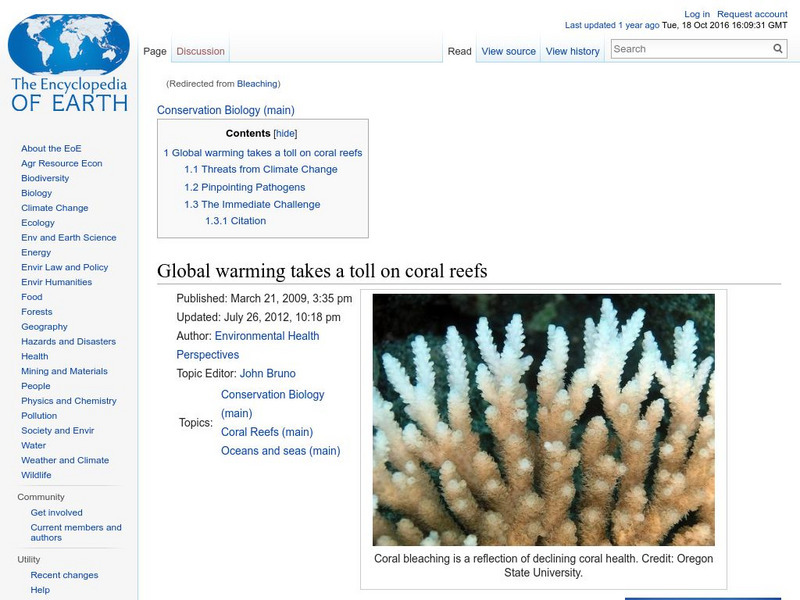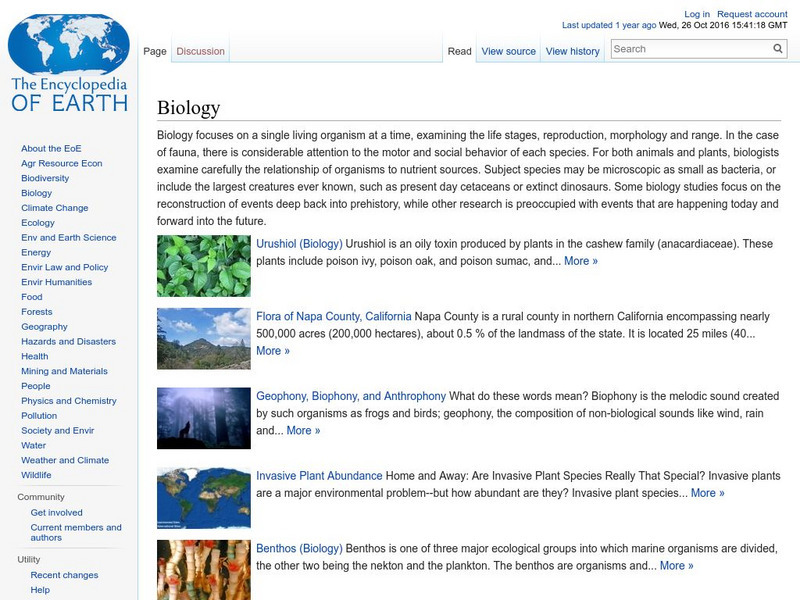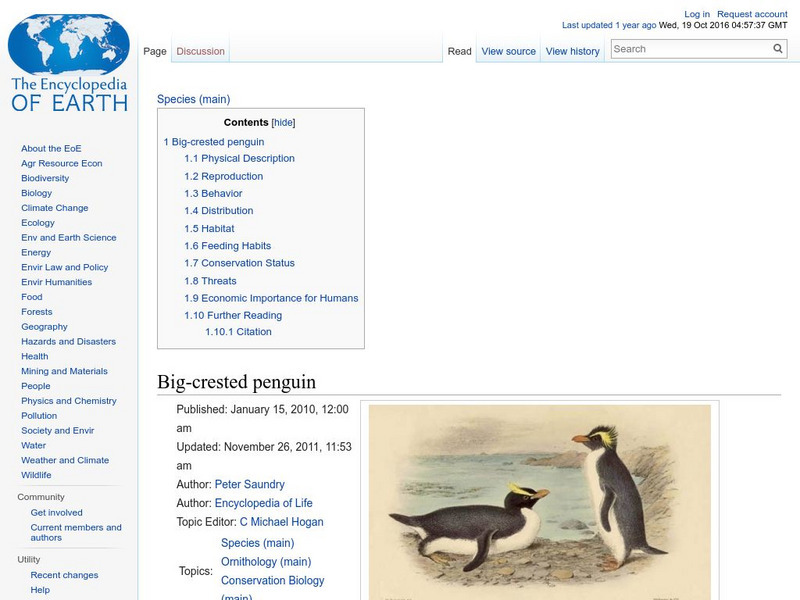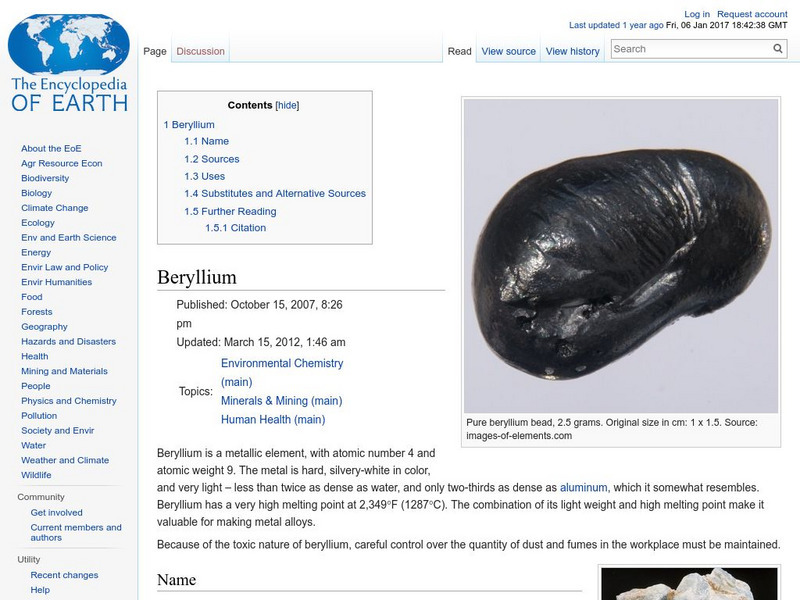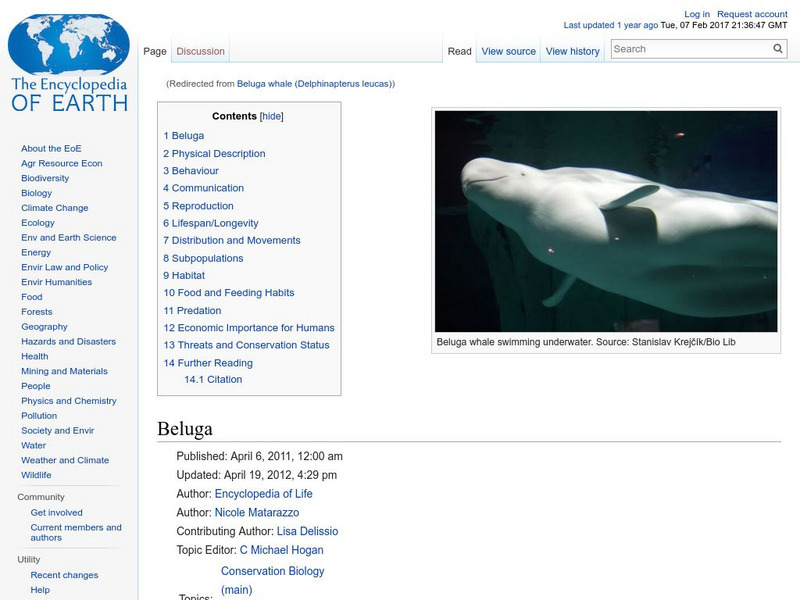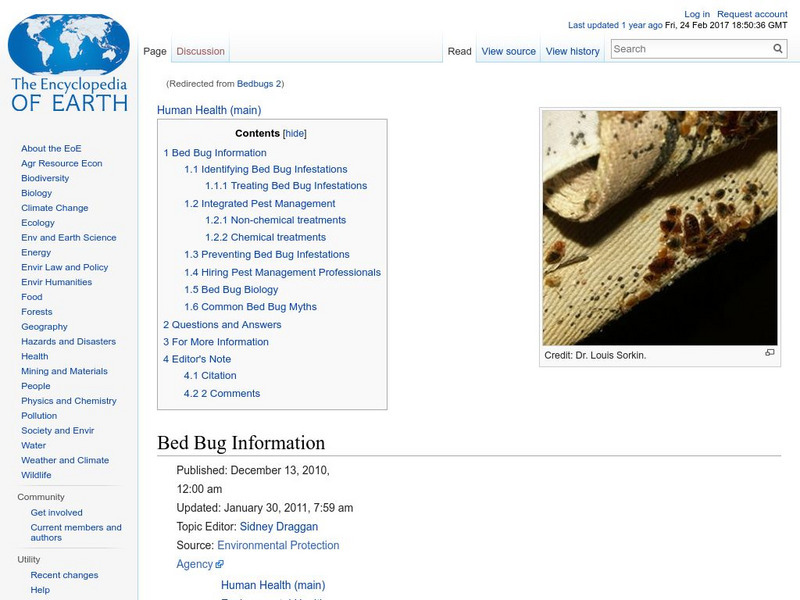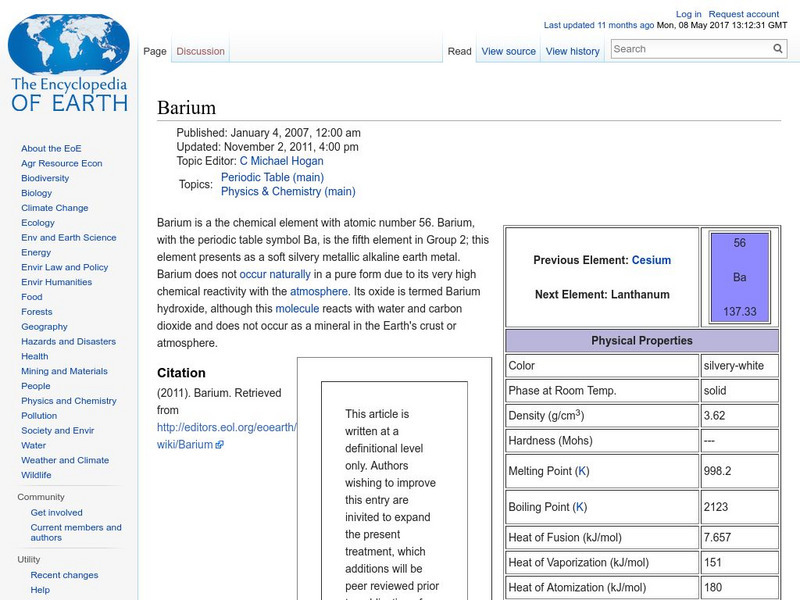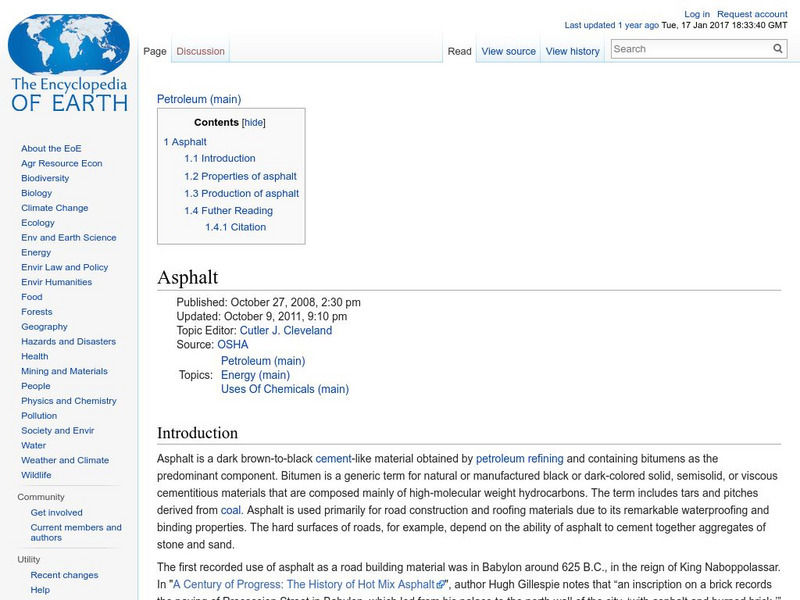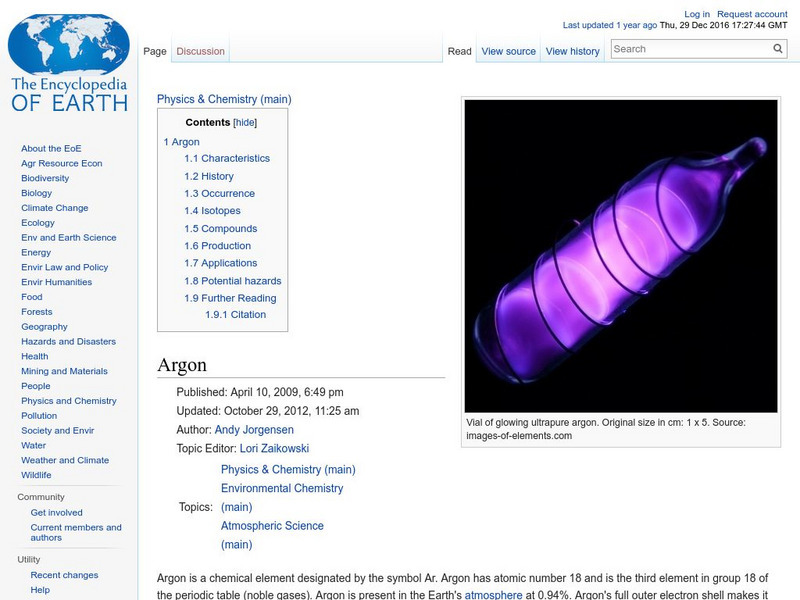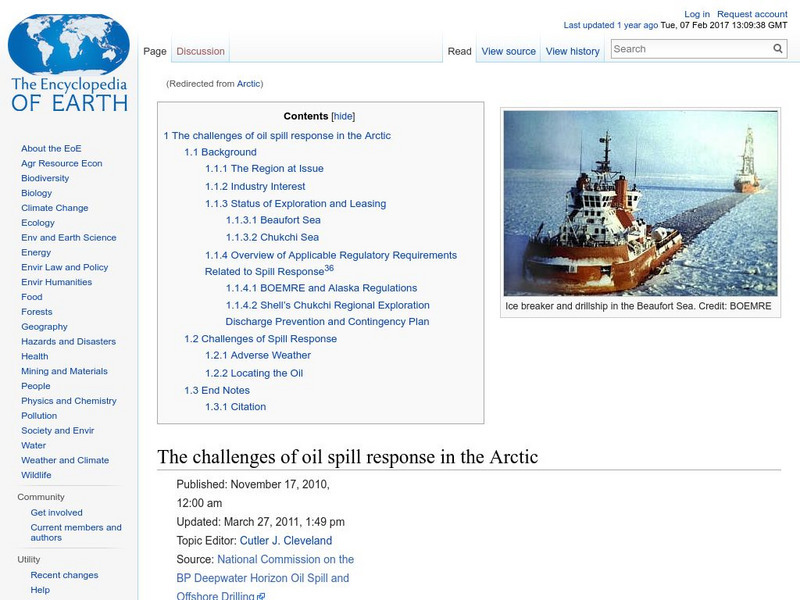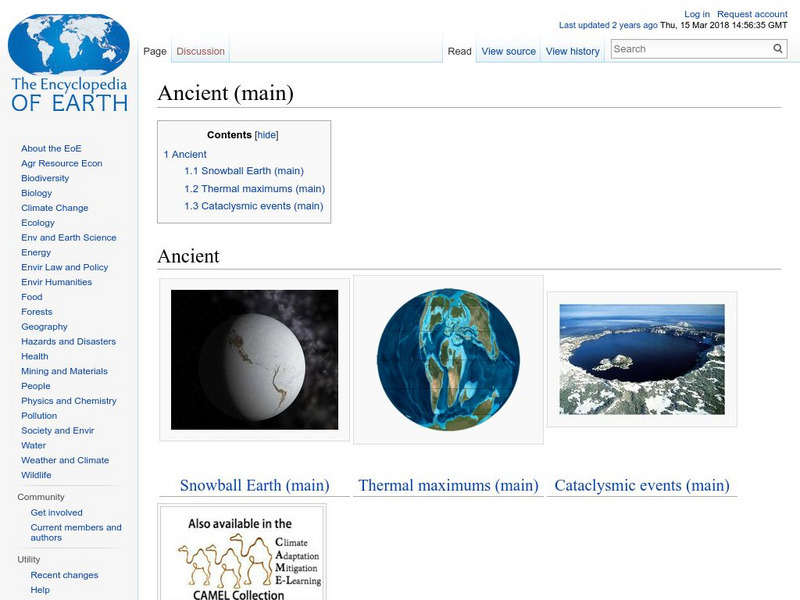Encyclopedia of Earth
Encyclopedia of Earth: Physics & Chemistry: Catalysis
Gives definition of catalysis, an explanation of how it works, different kinds of catalysis and examples, substances that impact on the catalytic process, the many applications of catalysis, and a history of catalyst technology.
Encyclopedia of Earth
Encyclopedia of Earth: Human Health: Carcinogen
Gives definition of a carcinogen, examples, and the two categories of carcinogens - those known to cause cancer in humans, and those 'anticipated' to cause it.
Encyclopedia of Earth
Encyclopedia of Earth: Physics & Chemistry: Carbon Monoxide
A description of the chemical and physical properties of carbon monoxide, its toxic effect on humans, sources of this gas, and beneficial uses. Includes a list of safety resource websites.
Encyclopedia of Earth
Encyclopedia of Earth: Physics & Chemistry: Calcium
Information about the element, Calcium, atomic number 20. Covers physical and atomic properties, sources, its role in geochemical cycles, how abundant it is on the Earth, its isotopes, some compounds of calcium, and its importance to...
Encyclopedia of Earth
Encyclopedia of Earth: Cadmium
Information about the element, Cadmium, atomic number 48. Covers physical and atomic properties, how abundant it is on the Earth, sources, its presence in the environment, uses, substitutes, and health considerations.
Encyclopedia of Earth
Encyclopedia of Earth: Cactus
Describes the physical features of different cacti, the variety of habitats where they can live, their distribution, evolution, taxonomy, and conservation status. (Published: January 10, 2011)
Encyclopedia of Earth
Encyclopedia of Earth: Botany: Bumblebee
Article on the bumblebee. Covers physical features, life in a colony and as a pollinator, and threats to its survival. Includes links to additional resources. (Published: April 14, 2008)
Encyclopedia of Earth
Encyclopedia of Earth: Bromine
Information about the element, Bromine, atomic number 35. Covers physical properties, atomic properties, how abundant it is on the Earth, and details about health-related regulations. Discusses sources, uses, and substitutes.
Encyclopedia of Earth
Encyclopedia of Earth: Boron
Information about the semi-metallic element, Boron, atomic number 5. Covers physical and atomic properties, how abundant it is on the Earth, sources, uses, and possible substitutes.
Encyclopedia of Earth
Encyclopedia of Earth: Biomes: Borneo Montane Rainforests
Describes the geography of the Borneo montane rainforests, their biodiversity, conservation status, and the types of threats they face. (Published: December 8, 2006)
Encyclopedia of Earth
Encyclopedia of Earth: Global Warming Takes a Toll on Coral Reefs
Article describing damage caused to coral reefs in the Caribbean after an extended period of extreme heat in 2005 that raised the ocean temperature in that area. The potential, devastating consequences to humans of coral reef destruction...
Encyclopedia of Earth
Encyclopedia of Earth: Biology
A large collection of articles covering many topics and specialized fields in the discipline of biology.
Encyclopedia of Earth
Encyclopedia of Earth: Biodiversity
A large collection of articles, news items, photos, slideshows, animations, and scientific reports, all related to biodiversity. Many articles on different ecosystems, e.g., deserts, grasslands, forests, etc. An excellent resource for...
Encyclopedia of Earth
Encyclopedia of Earth: Ornithology: Big Crested Penguin
Information about the Big-crested penguin: physical characteristics, behavior, reproduction, diet, distribution, threats to survival, conservation status, etc. (Published Jan. 10, 2010)
Encyclopedia of Earth
Encyclopedia of Earth: Beryllium
Information about the element, Beryllium, atomic number 4. Covers physical and atomic properties, how abundant it is on the Earth, sources, uses, and permissible exposure limits.
Encyclopedia of Earth
Encyclopedia of Earth: Berkelium
Information about the element, Berkelium, atomic number 97. Covers physical properties, atomic properties, how abundant it is on the Earth, and details about health-related regulations.
Encyclopedia of Earth
Encyclopedia of Earth: Animal Behavior: Beluga
Detailed information about the physical characteristics, behavior, life cycle, distribution, habitat, etc. of the beluga whale.
Encyclopedia of Earth
Encyclopedia of Earth: Entomology: Bed Bug Information
Detailed information about bed bugs: how to identify them, treating and preventing infestations, physical features, life cycle, and misconceptions about bed bugs. Includes links to additional resources. (Published: December 13, 2010)
Encyclopedia of Earth
Encyclopedia of Earth: Barium
Basic information about the element, Barium, atomic number 56. Covers physical and atomic properties, how abundant it is on the Earth, and permissible exposure limits.
Encyclopedia of Earth
Encyclopedia of Earth: Petroleum: Asphalt
Explains what asphalt is, its properties, and how it is produced.
Encyclopedia of Earth
Encyclopedia of Earth: Arsenic
Basic information about the element Arsenic, atomic number 33. Covers physical properties and properties, sources, how abundant it is on the Earth, uses, and toxicity.
Encyclopedia of Earth
Encyclopedia of Earth: Argon
Information about the element, Argon, atomic number 18. Covers physical and atomic properties, how abundant it is on the Earth, its history, isotopes, uses, and health considerations.
Encyclopedia of Earth
Encyclopedia of Earth: Arctic Ocean
Lengthy illustrated article about the Arctic Ocean discusses all the many features and characteristics of this vast northern ocean--sea ice, icebergs, ice shelves, ice islands, the Arctic Ocean floor, continental shelf--as well as the...
Encyclopedia of Earth
Encyclopedia of Earth: Climate Change: Ancient
A collection of articles on ancient climatology. They examine past extremes of the Earth's climate, cycles of climate change, and cataclysmic climate-changing events that are believed to have occurred.







